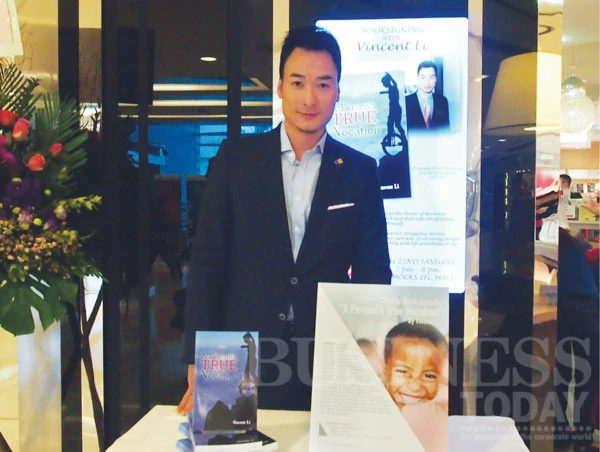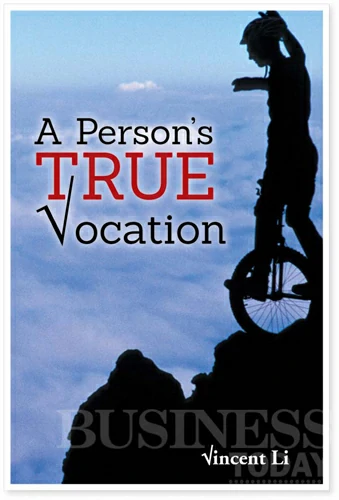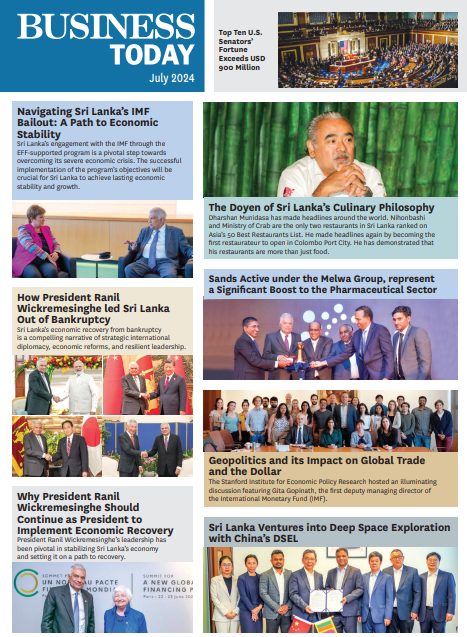
Vincent Li, CEO of a joint-venture airport services’ company based in Shanghai, has always aspired to be a writer and has now taken the first step in achieving his dream by penning A Person’s True Vocation. Through the book Li explores the efforts of five individuals who are facing various struggles in their careers while highlighting the importance of values and discovering one’s true self.
By Krishani Peiris
What inspired you to write the book?
A Person’s True Vocation revolves around five people and their stories that are interconnected. Through these stories I wanted to highlight some of the common problems that employees go through these days; issues such as job insecurity and worries related to redundancy, especially in the backdrop of the year 2009, just in the wake of the global financial crisis.
There are two main themes in the book. I borrowed the first theme from a book titled Demian, written by the Nobel laureate, Hermann Hesse. In that book he says that no matter what you do in life, there is only one genuine vocation for everyone finding the way to become yourself. As such, I was very inspired by this book and thought that I would base the first theme of my book on this thinking.
The second message that I wanted to bring out is that no matter what kind of problems we face in our career, or in life in general, the chances are that those problems amount to nothing when compared to the sufferings of many others in the world, especially those who are suffering from issues related to extreme poverty and severe deprivation. Sadly, such things are prevalent around the world today, where many people are unable to get out of.
As I work in the airline industry, I was able to work in many different countries and was exposed to different cultures. I was clearly inspired through all the different encounters and I thought no matter what happens and what we face in our lives, compared to those people who are going through extreme hardships, actually we are very lucky. However, we tend to take what we have, such as shelters, jobs, and food, for granted. And we tend to forget that many people around the world are suffering. All these factors led me to write this book.
As I Work In The Airline Industry, I Was Able To Work In Many Different Countries Around The World And Was Exposed To Different Cultures.
Why did you take Hong Kong as the premise for the book?
I based the book in Hong Kong for the simple fact that I am from Hong Kong, though I don’t live there now. Throughout my career, I have worked in different countries, such as Japan, Korea, the UAE and Oman, Canada, Indonesia and now China. But I was living in Indonesia during the last global financial crisis, therefore, more familiar with what was happening in Asia then.
The book is based in the backdrop of the recession that began in the West. Were the effects of the recession felt in Hong Kong as well? If so, did you draw in real live scenarios into the book?
The effects of the recession were surely felt in Hong Kong and Indonesia. In the book, I brought in some episodes such as demonstrations on the street by people during the time.
In those days, though the impact of the recession was not as severe as in the West, people in South East Asia also felt the effects to a certain extent, especially those who invested in stocks and bonds. They saw the value of their investment depreciating. For example, some people in Hong Kong bought the bonds issued by Lehman Brothers, the Wall Street investment bank that went bankrupt, and they lost all the money they invested with. In the book, I brought in episodes of those victims actually taking to the streets to demonstrate against the government and the banks who sold them those bonds. Although it was out of free will that people chose to invest, in the face of dissipation of their fortunes, they became desperate and expected the government to protect their investment.
There were many incidents related to people losing the value in their investment-properties, bonds and stocks-and surely some lost their jobs as well.
Though the characters are fictional in the book, I had to base my imagination on something. Therefore, I drew from what actually happened in the real world, and even from my friends’ experiences. The manners in which the characters thought and felt were based on my own thoughts and feelings.
How has the scenario, in the economic world, changed from then to now?
If you look at the macroeconomic environment, for example, in terms of the employment and GDP data, you may get a sense that overall the situation is improving from what it was. However, if you look at the micro levels, anywhere in the world, there are still many people who are going through difficult times. They are suffering because, regardless of the industry, the world has changed and it has become more competitive. New business models, especially those that take advantage of the Internet, and the change in the political environment in Hong Kong have left people who cannot adapt fast enough struggling.
One important fact is that the young generation nowadays thinks in ways which are very different from how we thought back in our time.In A Person’s True Vocation, I draw parallels between how the young people of different generations think. Back in the 1980s it was hard to obtain a good job and it was still harder to get further education in Hong Kong. However, while there may be more entry-level jobs available now than the old days, young people nowadays tend to be more choosy. They do not want entry-level jobs as they are not satisfied with just earning a basic keep. In many other ways, the world has changed. The new generation of today does not look for just jobs, young people also look for freedom-especially political freedom.
Due To The Combination Of Change In The Political Environment In Hong Kong And The Demography, At Micro Levels, We Still See Much Discontent From The New Generation.
Though in the economic sense it would seem that everything is getting better, due to the combination of changes in the political environment and the demography in Hong Kong, at the micro levels, we still see much discontent from the new generation.
What is your impression of the young job seekers of today?
In the book there is one character who lost his job at the publishing company he was working in. Though his aspirations lie in the field of media reporting, as he was made redundant for two months already and had to find a way to support himself, he began to try to find a job in any field possible. And then he tried to find work in a fast-food restaurant. He first applied for the chef position in the kitchen, even though he had no experience of working in a kitchen before. The only reason he wanted to work as a chef instead of a waiter in the restaurant was because the kitchen was a closed environment, as he did not want to be seen by any of his friends or associates serving food to customers. The main reason for applying for such a job was desperation.
What I wanted to reveal through this character is that like so many youngsters today, he thinks he can talk his way through even though he has no experience in the field. This is a prevalent characteristic of many young people, bearing this impression that “if I know just enough I can always talk my way through the rest of it”. I feel that they do not try hard enough in learning the real stuff. However, they may know a thing or two about it, which gives them the confidence that they can somehow talk their way through the ‘job’. That’s a cynical scenario I wanted to depict.
What are your thoughts on the book and how did you work your way through the plot?
To a great extent the book comprises of a free flow of my imagination. When I first began writing it, I was in Indonesia. For many years I have been writing, but never made enough of an effort to write a complete story. Therefore in 2009, when I was in Indonesia, I decided to try to put my thoughts down on to paper. I do not remember the exact sequence of my imagination at the time. Furthermore, as I have a full-time job, I was only able to write on and off. Whenever I had an inspiring thought, I quickly put it down in writing. But then I remember there were times when nothing came to my mind, and I was occupied with my full-time job; then no progress was made. As such, whenever I had free time over the years, I picked up again from where I left off and let my imagination flow again. The stories to some extent depended on what happened around me and who I came across at the time. And when I found the theme in Hermann Hesse’s Demian, I was able to weave these different stories together to present a more cohesive piece of work. That is, no matter what you do, it is about finding your own way to become yourself in different kinds of situations.
Can you speak about yourself?
I am a corporate executive. I work for an airline where I first joined over 22 years ago. As my job entailed much travelling and even living and working overseas, I got extensive international exposure to many different cultures. About three years ago, I was assigned to Shanghai and have been working there ever since. My mission for the company then was to set up a joint venture with a state-owned-enterprise in China. Now that the company is up and running, my next goal is to ensure its long-term sustainability and profitability. This is a first-time experience for me as I have never worked in China nor have I tried to set up a joint-venture company-let alone with a state-owned-enterprise–before. All these gave a new perspective to my career.
Do Not Just Rush Into Things And Be Affected By Short-Term Failures. It Is Not About One Shot, But About A Lifetime.
Everyone should have at least a hobby and writing is mine. I have always enjoyed reading and writing. However, I could not recall at what age I actually got the ambition to become an author, but I feel it has always been on my mind. When I read a book from a good author such as Charles Dickens or George Orwell, I always wish I could write and express my thoughts like they did.
And I was finally able to accomplish my dream. If you actually sit down and let yourself be immersed in your thoughts, you can begin to see them through. It’s funny how the mind works. You can loosen up yourself and useful insights will gradually come to your mind. For me, writing is an enlightening process.
Any future plans?
I will continue to work hard in my company and, as a salary-man in the corporate environment, to make my way up. That is the nature of the corporate world. However, now that I have begun doing something on the side, for myself, I will continue to grow and enjoy it. I have already started to write a new book, which is not a fiction but one that reflects my own experiences through the years. I feel these are experiences which I can share with others. And frankly, writing is a good way to prepare for retirement and to keep myself occupied and productive.
What advice would you give young professionals?
I believe that every man has a dream. No matter what you do, what stage you are at and whatever hard times you are going through, you have to be in touch with your inner self and find a way to be yourself. Those who are well settled, in terms of occupation and life, tend to take it for granted, thinking ‘this is it’. However, life is fickle and full of paradoxes. As I alluded to in the last chapter of the book, you see many rich people who have lost their fortunes during the financial crisis. And then you see people who rise through hard work.
I believe that people, especially those in their youth, should have much to look forward to in their future, and they need to keep their faith. They need to understand their inner self, how the mind works and what factors are responsible for their feelings of fear or happiness. Underneath a person’s surface, there are many factors that affect his or her behaviour-intentions, perceptions, assumptions, and, more fundamentally, his values. Therefore, I believe it is critical that people spend time understanding what is important to them and what they truly value.
Recently I was in Hong Kong to give a speech to some students and there I spoke about values. It is significant to understand the concept of values. Value is not just about money, it is about happiness, what makes one happy. Steve Jobs often said that life is about finding what you love doing. In his commencement speech at Stanford University in 2005, Steve Jobs told the audience of his own experience. He was guided by his inner self and focused on what he enjoyed doing. His speech was very inspiring.
Therefore the lesson many young people have to learn and understand is what you truly value. Do not just rush into things and be affected by short-term failures. It is not about one shot, but about a lifetime.
Final thoughts?
Thank you for showing an interest in my book and you can purchase it online. Sri Lanka is a country that I have not been to yet and I hope to visit the country soon.
What inspired you to write the book?
A Person’s True Vocation revolves around five people and their stories that are interconnected. Through these stories I wanted to highlight some of the common problems that employees go through these days; issues such as job insecurity and worries related to redundancy, especially in the backdrop of the year 2009, just in the wake of the global financial crisis.
There are two main themes in the book. I borrowed the first theme from a book titled Demian, written by the Nobel laureate, Hermann Hesse. In that book he says that no matter what you do in life, there is only one genuine vocation for everyone finding the way to become yourself. As such, I was very inspired by this book and thought that I would base the first theme of my book on this thinking.
The second message that I wanted to bring out is that no matter what kind of problems we face in our career, or in life in general, the chances are that those problems amount to nothing when compared to the sufferings of many others in the world, especially those who are suffering from issues related to extreme poverty and severe deprivation. Sadly, such things are prevalent around the world today, where many people are unable to get out of.
As I work in the airline industry, I was able to work in many different countries and was exposed to different cultures. I was clearly inspired through all the different encounters and I thought no matter what happens and what we face in our lives, compared to those people who are going through extreme hardships, actually we are very lucky. However, we tend to take what we have, such as shelters, jobs, and food, for granted. And we tend to forget that many people around the world are suffering. All these factors led me to write this book.
As I Work In The Airline Industry, I Was Able To Work In Many Different Countries Around The World And Was Exposed To Different Cultures.
Why did you take Hong Kong as the premise for the book?
I based the book in Hong Kong for the simple fact that I am from Hong Kong, though I don’t live there now. Throughout my career, I have worked in different countries, such as Japan, Korea, the UAE and Oman, Canada, Indonesia and now China. But I was living in Indonesia during the last global financial crisis, therefore, more familiar with what was happening in Asia then.
The book is based in the backdrop of the recession that began in the West. Were the effects of the recession felt in Hong Kong as well? If so, did you draw in real live scenarios into the book?
The effects of the recession were surely felt in Hong Kong and Indonesia. In the book, I brought in some episodes such as demonstrations on the street by people during the time.
In those days, though the impact of the recession was not as severe as in the West, people in South East Asia also felt the effects to a certain extent, especially those who invested in stocks and bonds. They saw the value of their investment depreciating. For example, some people in Hong Kong bought the bonds issued by Lehman Brothers, the Wall Street investment bank that went bankrupt, and they lost all the money they invested with. In the book, I brought in episodes of those victims actually taking to the streets to demonstrate against the government and the banks who sold them those bonds. Although it was out of free will that people chose to invest, in the face of dissipation of their fortunes, they became desperate and expected the government to protect their investment.
There were many incidents related to people losing the value in their investment-properties, bonds and stocks-and surely some lost their jobs as well.
Though the characters are fictional in the book, I had to base my imagination on something. Therefore, I drew from what actually happened in the real world, and even from my friends’ experiences. The manners in which the characters thought and felt were based on my own thoughts and feelings.
How has the scenario, in the economic world, changed from then to now?
If you look at the macroeconomic environment, for example, in terms of the employment and GDP data, you may get a sense that overall the situation is improving from what it was. However, if you look at the micro levels, anywhere in the world, there are still many people who are going through difficult times. They are suffering because, regardless of the industry, the world has changed and it has become more competitive. New business models, especially those that take advantage of the Internet, and the change in the political environment in Hong Kong have left people who cannot adapt fast enough struggling.
One important fact is that the young generation nowadays thinks in ways which are very different from how we thought back in our time.In A Person’s True Vocation, I draw parallels between how the young people of different generations think. Back in the 1980s it was hard to obtain a good job and it was still harder to get further education in Hong Kong. However, while there may be more entry-level jobs available now than the old days, young people nowadays tend to be more choosy. They do not want entry-level jobs as they are not satisfied with just earning a basic keep. In many other ways, the world has changed. The new generation of today does not look for just jobs, young people also look for freedom-especially political freedom.
Due To The Combination Of Change In The Political Environment In Hong Kong And The Demography, At Micro Levels, We Still See Much Discontent From The New Generation.
Though in the economic sense it would seem that everything is getting better, due to the combination of changes in the political environment and the demography in Hong Kong, at the micro levels, we still see much discontent from the new generation.
What is your impression of the young job seekers of today?
In the book there is one character who lost his job at the publishing company he was working in. Though his aspirations lie in the field of media reporting, as he was made redundant for two months already and had to find a way to support himself, he began to try to find a job in any field possible. And then he tried to find work in a fast-food restaurant. He first applied for the chef position in the kitchen, even though he had no experience of working in a kitchen before. The only reason he wanted to work as a chef instead of a waiter in the restaurant was because the kitchen was a closed environment, as he did not want to be seen by any of his friends or associates serving food to customers. The main reason for applying for such a job was desperation.
What I wanted to reveal through this character is that like so many youngsters today, he thinks he can talk his way through even though he has no experience in the field. This is a prevalent characteristic of many young people, bearing this impression that “if I know just enough I can always talk my way through the rest of it”. I feel that they do not try hard enough in learning the real stuff. However, they may know a thing or two about it, which gives them the confidence that they can somehow talk their way through the ‘job’. That’s a cynical scenario I wanted to depict.
What are your thoughts on the book and how did you work your way through the plot?
To a great extent the book comprises of a free flow of my imagination. When I first began writing it, I was in Indonesia. For many years I have been writing, but never made enough of an effort to write a complete story. Therefore in 2009, when I was in Indonesia, I decided to try to put my thoughts down on to paper. I do not remember the exact sequence of my imagination at the time. Furthermore, as I have a full-time job, I was only able to write on and off. Whenever I had an inspiring thought, I quickly put it down in writing. But then I remember there were times when nothing came to my mind, and I was occupied with my full-time job; then no progress was made. As such, whenever I had free time over the years, I picked up again from where I left off and let my imagination flow again. The stories to some extent depended on what happened around me and who I came across at the time. And when I found the theme in Hermann Hesse’s Demian, I was able to weave these different stories together to present a more cohesive piece of work. That is, no matter what you do, it is about finding your own way to become yourself in different kinds of situations.
Can you speak about yourself?
I am a corporate executive. I work for an airline where I first joined over 22 years ago. As my job entailed much travelling and even living and working overseas, I got extensive international exposure to many different cultures. About three years ago, I was assigned to Shanghai and have been working there ever since. My mission for the company then was to set up a joint venture with a state-owned-enterprise in China. Now that the company is up and running, my next goal is to ensure its long-term sustainability and profitability. This is a first-time experience for me as I have never worked in China nor have I tried to set up a joint-venture company-let alone with a state-owned-enterprise–before. All these gave a new perspective to my career.
Do Not Just Rush Into Things And Be Affected By Short-Term Failures. It Is Not About One Shot, But About A Lifetime.
Everyone should have at least a hobby and writing is mine. I have always enjoyed reading and writing. However, I could not recall at what age I actually got the ambition to become an author, but I feel it has always been on my mind. When I read a book from a good author such as Charles Dickens or George Orwell, I always wish I could write and express my thoughts like they did.
And I was finally able to accomplish my dream. If you actually sit down and let yourself be immersed in your thoughts, you can begin to see them through. It’s funny how the mind works. You can loosen up yourself and useful insights will gradually come to your mind. For me, writing is an enlightening process.
Any future plans?
I will continue to work hard in my company and, as a salary-man in the corporate environment, to make my way up. That is the nature of the corporate world. However, now that I have begun doing something on the side, for myself, I will continue to grow and enjoy it. I have already started to write a new book, which is not a fiction but one that reflects my own experiences through the years. I feel these are experiences which I can share with others. And frankly, writing is a good way to prepare for retirement and to keep myself occupied and productive.
What advice would you give young professionals?
I believe that every man has a dream. No matter what you do, what stage you are at and whatever hard times you are going through, you have to be in touch with your inner self and find a way to be yourself. Those who are well settled, in terms of occupation and life, tend to take it for granted, thinking ‘this is it’. However, life is fickle and full of paradoxes. As I alluded to in the last chapter of the book, you see many rich people who have lost their fortunes during the financial crisis. And then you see people who rise through hard work.
I believe that people, especially those in their youth, should have much to look forward to in their future, and they need to keep their faith. They need to understand their inner self, how the mind works and what factors are responsible for their feelings of fear or happiness. Underneath a person’s surface, there are many factors that affect his or her behaviour-intentions, perceptions, assumptions, and, more fundamentally, his values. Therefore, I believe it is critical that people spend time understanding what is important to them and what they truly value.
Recently I was in Hong Kong to give a speech to some students and there I spoke about values. It is significant to understand the concept of values. Value is not just about money, it is about happiness, what makes one happy. Steve Jobs often said that life is about finding what you love doing. In his commencement speech at Stanford University in 2005, Steve Jobs told the audience of his own experience. He was guided by his inner self and focused on what he enjoyed doing. His speech was very inspiring.
Therefore the lesson many young people have to learn and understand is what you truly value. Do not just rush into things and be affected by short-term failures. It is not about one shot, but about a lifetime.
Final thoughts?
Thank you for showing an interest in my book and you can purchase it online. Sri Lanka is a country that I have not been to yet and I hope to visit the country soon.









